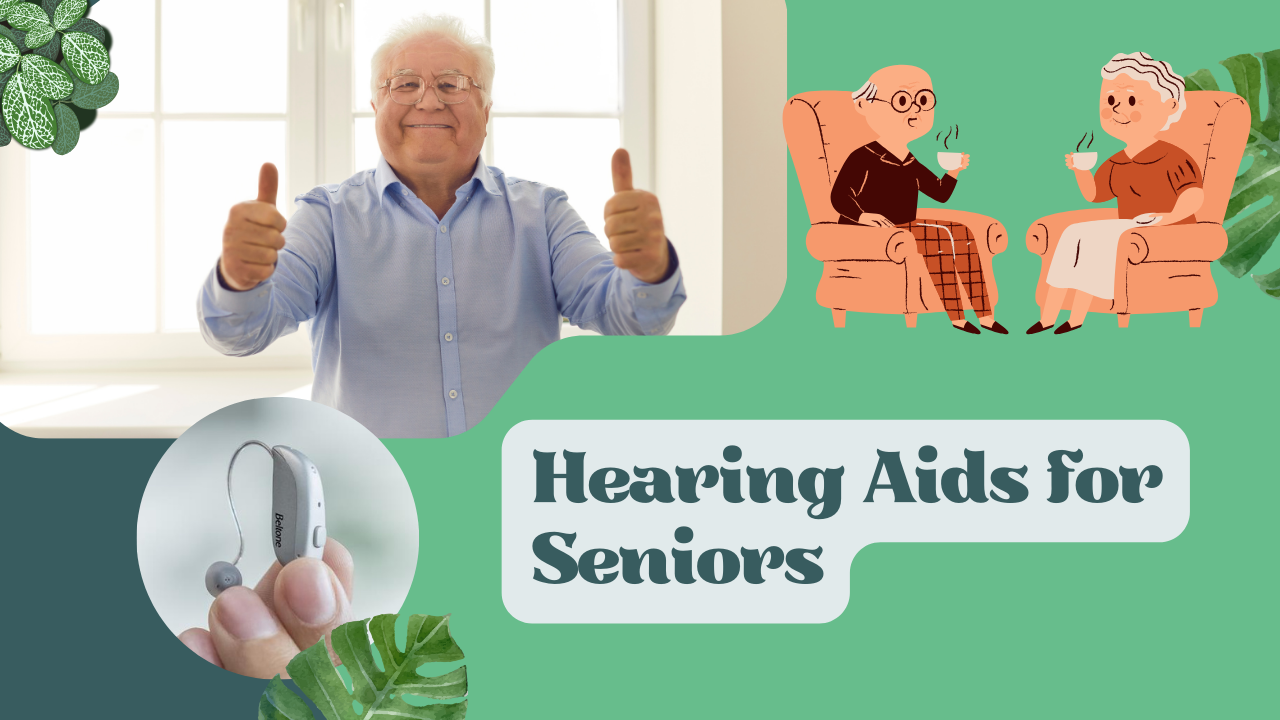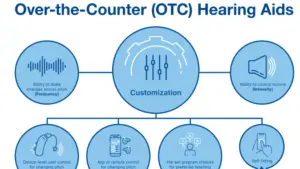Hearing Aids for Seniors Reclaim Your Hearing & Your Life! Struggling with hearing loss but worried about the cost of hearing aids? You’re not alone! Discover affordable hearing solutions for seniors, from OTC devices to budget-friendly models. Reconnect with loved ones, boost your well-being, and regain your independence. Explore financial assistance programs, find helpful resources, and get expert tips on choosing the right option for you. Hear the world clearly again and embrace a brighter future – it’s all within reach!
The Vital Role of Hearing Aids for Seniors: Balancing Need with Affordability
Introduction:
As we age, our senses begin to diminish, and hearing loss frequently becomes a significant challenge. This is particularly true for seniors, with research suggesting that nearly 50% of individuals over 75 experience some form of hearing loss. While often seen as a natural part of aging, unaddressed hearing loss can have a profound impact on a senior’s life, affecting their communication, social interaction, mental well-being, and overall quality of life.
The Importance of Hearing Aids for Seniors:
Hearing aids are not just about amplifying sound; they are sophisticated devices that can drastically improve a senior’s ability to hear and understand speech in various environments. Here’s why they are crucial:
- Enhances communication: Improved hearing allows seniors to engage in conversations more easily, leading to stronger relationships with family and friends, reduced isolation, and increased social participation.
- Boosts cognitive health: Studies show that unaddressed hearing loss can contribute to cognitive decline and dementia. Hearing aids help stimulate the brain and can potentially slow down cognitive decline.
- Improves safety: Hearing important sounds like alarms, approaching vehicles, or sirens can prevent accidents and help seniors maintain their independence.
- Elevates mental well-being: Reduced frustration from poor hearing and improved social interaction can combat feelings of loneliness and depression, leading to a better overall mental state.
The Affordability Challenge:
Despite the undeniable benefits, access to hearing aids remains a significant hurdle for many seniors due to their high cost. Traditional hearing aids can range from thousands to tens of thousands of dollars, often placing them beyond the reach of individuals with limited financial resources. This creates a disparity in access to this life-changing technology, disproportionately impacting seniors with fixed incomes and those relying on public insurance programs that typically offer limited coverage for hearing aids.
Addressing the Affordability Gap:
Fortunately, there are ongoing efforts to improve affordability and accessibility:
- Over-the-counter (OTC) Hearing Aids: The recent FDA approval of OTC hearing aids in the US offers a more affordable option for individuals with mild to moderate hearing loss. While not a replacement for professional evaluation and fitting, they provide a lower-cost entry point.
- Technological advancements: Advancements in technology are leading to the development of smaller, more discreet, and potentially cheaper hearing aids.
- Financial assistance programs: Non-profit organizations and government programs offer financial assistance for hearing aids to eligible individuals.
- Increased insurance coverage: Advocacy efforts continue to push for broader coverage of hearing aids under private and public insurance plans.
Understanding Hearing Loss in Seniors: Unveiling Causes and Consequences
Common Causes of Hearing Loss in Older Adults:
Age-related hearing loss, known as presbycusis, is the most common culprit, affecting nearly one in three adults over 65. It’s caused by gradual degeneration of hair cells in the inner ear, responsible for converting sound waves into electrical signals. However, other factors can also contribute:
- Noise exposure: Prolonged exposure to loud noises, like occupational hazards or recreational activities, can damage hair cells.
- Medical conditions: Diabetes, high blood pressure, and heart disease can increase the risk of hearing loss.
- Medications: Certain medications can have ototoxic effects, damaging the inner ear and causing hearing loss.
- Ear infections and injuries: Repeated ear infections or head injuries can damage the structures involved in hearing.
- Genetic factors: Inherited genes can play a role in the development and progression of hearing loss.
Impact of Untreated Hearing Loss on Seniors’ Quality of Life:
Leaving hearing loss untreated can have a cascading effect on various aspects of a senior’s life:
- Communication difficulties: Misunderstanding conversations, asking for repetitions, and withdrawing from social interactions due to frustration.
- Social isolation: Reduced social engagement due to communication challenges, leading to loneliness and depression.
- Cognitive decline: Studies suggest a link between unaddressed hearing loss and increased risk of cognitive decline and dementia.
- Safety concerns: Inability to hear important sounds like alarms, sirens, or traffic can pose safety risks.
- Reduced quality of life: Overall diminished enjoyment of daily activities and decreased sense of well-being.
Addressing the Issue:
Early detection and intervention are crucial in mitigating the negative impacts of hearing loss. Encouraging seniors to get regular hearing assessments and discussing treatment options with healthcare professionals is essential. Fortunately, options like hearing aids, assistive listening devices, and communication strategies can significantly improve seniors’ ability to connect with the world around them.
The Ripple Effect of Affordable Hearing Aids: Connecting Seniors to a Life Unmasked
The high cost of traditional hearing aids often creates a barrier for seniors, leaving them grappling with the debilitating effects of untreated hearing loss. However, the emergence of affordable hearing aid options like OTC devices and technological advancements offers a beacon of hope, promising a cascade of positive impacts on their lives. Let’s delve into the tangible benefits these affordable solutions unlock:
1. Reigniting Communication and Social Connection:
One of the most transformative consequences of affordable hearing aids is the restoration of clear communication. Imagine a senior effortlessly following conversations, confidently engaging in social gatherings, and rekindling connections with loved ones. Affordable solutions empower them to actively participate in life, reducing social isolation and fostering meaningful interactions.
2. Boosting Cognitive Function and Mental Well-being:
The strain of unaddressed hearing loss can take a toll on cognitive function. Studies suggest a link between hearing loss and an increased risk of cognitive decline and dementia. Affordable hearing aids help stimulate the brain by providing access to sound, potentially slowing down cognitive decline and improving memory. Additionally, improved communication and social interaction can combat feelings of loneliness and depression, leading to enhanced mental well-being.
3. Embracing Safety and Independence:
Affordable hearing aids don’t just improve communication; they offer a shield of safety. Seniors can become more aware of their surroundings, hearing important sounds like alarms, approaching vehicles, and sirens. This empowers them to maintain their independence and navigate daily activities with confidence, reducing the risk of accidents and falls.
4. Unlocking a World of Possibilities:
Beyond the aforementioned benefits, affordable hearing aids unlock a world of possibilities for seniors. They can:
- Enjoy favorite activities: Listening to music, attending lectures, or watching movies becomes a delight once again.
- Reconnect with hobbies: Participating in group activities like singing, dancing, or playing games becomes more accessible.
- Maintain employment: Improved communication can enhance work performance and career opportunities.
With the growing availability of affordable hearing aids, making an informed decision becomes crucial. Here are some key factors to consider when navigating the exciting yet overwhelming world of budget-friendly hearing solutions:
Types of Hearing Aids:
- Over-the-counter (OTC) hearing aids: These are self-fitting options for mild to moderate hearing loss, offering a more accessible entry point due to lower prices and no audiologist requirement.
- Behind-the-ear (BTE): Versatile and adaptable, suitable for various hearing loss severities. Features microphone and receiver behind the ear, connected by tubing or wirelessly.
- In-the-ear (ITE): Custom-made to fit inside the outer ear canal, offering discretion and comfort. Available in different styles like In-the-canal (ITC) and Completely-in-canal (CIC) for deeper insertion.
- Receiver-in-canal (RIC): Similar to BTE but with a smaller receiver placed in the canal for better sound quality and less occlusion (feeling of fullness).
Features to Consider:
- Noise cancellation: Reduces unwanted background noise for better clarity in noisy environments.
- Directional microphones: Focuses on speech coming from the front, improving speech understanding in difficult listening situations.
- Bluetooth connectivity: Stream audio directly from phones, TVs, and other devices for enhanced convenience.
- Rechargeable batteries: Eliminates the need for frequent battery replacements, offering cost savings and environmental benefits.
- Warranty and after-sales support: Choose a brand with reliable warranty coverage and readily available customer support.
Comfort and Usability:
- Size and weight: Opt for a size and weight comfortable to wear for extended periods, especially for ITE options.
- Ease of use: Consider features like volume controls, program switching, and battery accessibility based on your dexterity and technical comfort level.
- Customization: While OTC options may offer limited customization, consider ITE models for a more personalized fit and comfort.
Additional Tips:
- Consult an audiologist: Even with OTC options, seeking professional guidance for hearing assessment, initial fitting, and ongoing support is highly recommended.
- Research and compare: Analyze features, user reviews, and price points across different brands and models within your budget.
- Trial periods: Look for brands offering trial periods to ensure the chosen device meets your needs and preferences.
Affordable Hearing Aid Options
Sure, here are some affordable hearing aid options:
1. Over-the-counter (OTC) hearing aids:
The FDA recently approved OTC hearing aids for adults with mild to moderate hearing loss. This is a more affordable option than traditional hearing aids, which can cost thousands of dollars. OTC hearing aids typically cost between $200 and $500.
2. Basic models from reputable brands:
Many hearing aid manufacturers offer basic models that are more affordable than their top-of-the-line models. These basic models may not have all the bells and whistles, but they can still provide significant benefits for people with mild to moderate hearing loss.
3. Discount programs and financial assistance options:
There are a number of discount programs and financial assistance options available to help people afford hearing aids. Some hearing aid manufacturers offer discounts to veterans, seniors, and other groups. There are also government programs and non-profit organizations that can provide financial assistance for hearing aids.
Here are some specific examples of affordable hearing aid options:
OTC hearing aids:
-
- Jabra Enhance ($799)
- Lexie Hearing ($799)
- MDHearing ($299)
Basic models from reputable brands:
-
- Phonak Audéo Fit ($1,995)
- Oticon Opn S1 Mini ($2,195)
- Starkey Livio AI 1000 ($2,295)
Discount programs and financial assistance options:
-
- Hearing Loss Association of America (HLAA): Offers a number of resources to help people afford hearing aids, including a financial assistance program.
- American Speech-Language-Hearing Association (ASHA): Provides information on hearing loss and hearing aids, including a list of financial assistance programs.
- Starkey Hearing Foundation: Offers hearing aids at a reduced cost to people who qualify.
Additional tips for finding affordable hearing aids:
- Shop around: Compare prices from different hearing aid providers.
- Consider refurbished hearing aids: You can save money by purchasing refurbished hearing aids.
- Look for financing options: Some hearing aid providers offer financing options that can make hearing aids more affordable.
- Don’t be afraid to negotiate: You may be able to negotiate the price of hearing aids with your hearing aid provider.
The high cost of hearing aids can create a significant barrier for many who need them. However, with some research and ingenuity, you can find ways to make hearing solutions more accessible. Here are some helpful tips:
1. Research Available Resources and Programs:
- Government benefits: Medicare and Medicaid have limited coverage for hearing aids, but some state programs offer additional assistance. Explore options provided by your state’s department of aging or health and human services.
- Non-profit organizations: Organizations like the Hearing Loss Association of America (HLAA) and the Starkey Hearing Foundation offer financial assistance programs and discounted hearing aids.
- Employer-sponsored programs: Some employers offer health insurance plans that cover hearing aids or provide discounts through partnerships with hearing aid providers.
- Veterans benefits: The Veterans Administration (VA) provides hearing aids and related services to eligible veterans.
2. Seek Out Discounts and Promotions:
- Manufacturer discounts: Many hearing aid manufacturers offer discounts to veterans, seniors, and other groups. Check their websites or contact them directly for details.
- Retailer promotions: Look for special offers and sales at hearing aid retailers or online stores.
- Refurbished hearing aids: Consider purchasing refurbished hearing aids, which can offer significant savings on high-quality devices.
- Bundle deals: Some retailers offer discounted packages that include hearing aids, accessories, and after-care services.
3. Explore Alternative Financing Options:
- Hearing aid manufacturer financing: Some manufacturers offer financing programs with low interest rates or extended payment plans.
- Third-party financing: Consider loans from banks or credit unions specifically designed for medical equipment purchases.
- CareCredit: This healthcare financing company offers low-interest financing for various medical expenses, including hearing aids.
- Payment plans: Talk to your hearing aid provider about offering a payment plan that fits your budget.
Additional Tips:
- Shop around and compare prices: Don’t limit yourself to one provider. Get quotes from different hearing aid dispensaries and online retailers.
- Consider OTC hearing aids: Over-the-counter hearing aids may be a viable option for mild to moderate hearing loss and offer a lower price point.
- Focus on essential features: Prioritize features that are most important to you and avoid paying for unnecessary bells and whistles.
- Seek professional guidance: An audiologist can assess your hearing needs and recommend the most appropriate and cost-effective solution for you.
Hearing the World Again: Real-Life Stories of Affordable Hearing Solutions
The impact of affordable hearing aids extends far beyond improved sound clarity. Here are a few heartwarming testimonials from seniors who have found success with budget-friendly hearing solutions:
1. Reconnecting with Family:
“For years, dinner conversations with my grandkids felt hollow. I missed their jokes and stories, feeling increasingly isolated. Then, I discovered OTC hearing aids! Now, laughter fills the table again, and I catch every precious word. It’s a gift!” – Mary, 72
2. Reigniting Passions:
“My love for music faded as hearing loss dulled the melodies. Thanks to a refurbished hearing aid I found online, I can finally enjoy my favorite songs! Now, I even attend live concerts, fully immersed in the vibrant sounds.” – John, 80
3. Boosting Confidence and Independence:
“Asking people to repeat themselves became so embarrassing. My confidence plummeted. Affordable hearing aids changed everything! Now, I confidently participate in meetings, order food without worry, and navigate public spaces with ease.” – Sarah, 68
4. Rediscovering the Joy of Learning:
“Lectures and workshops became frustrating noise due to my hearing loss. With my new budget-friendly hearing aid, I’m back in the learning game! I actively participate in discussions, asking questions and expanding my knowledge.” – David, 75
5. Embracing Social Connections:
“Isolation due to hearing loss made me withdraw from social activities. Now, thanks to my affordable hearing aid, I can truly engage in conversations with friends and family. Laughter and meaningful bonding have returned to my life!” – Anna, 71
These are just a few glimpses into the transformative power of affordable hearing solutions. By overcoming the cost barrier, seniors rediscover the joy of communication, reconnect with loved ones, and embrace life with renewed confidence and well-being. Their stories serve as a beacon of hope and encouragement for others facing similar challenges.
Conclusion
The silence that accompanies hearing loss can shroud the golden years of seniors, isolating them from loved ones and stifling their enjoyment of life. While the cost of traditional hearing aids often presented a formidable barrier, affordable solutions are now within reach. From innovative over-the-counter devices to budget-friendly models, the landscape is transforming, offering seniors a lifeline to reconnect with the world around them. This is not just about hearing better; it’s about empowering individuals to engage in life with renewed confidence, fostering cherished connections, and reclaiming their independence. Let us encourage seniors to prioritize their hearing health, explore these affordable options, and embrace the gift of clear communication once again. By working together, we can ensure that every senior has the opportunity to experience the vibrant richness of life, unburdened by the limitations of hearing loss.
FAQs: Affordable Hearing Solutions for Seniors
1. Why is affordable hearing healthcare important for seniors?
Untreated hearing loss can lead to communication challenges, social isolation, cognitive decline, and safety risks. Affordable hearing solutions allow seniors to access the benefits of improved hearing without breaking the bank.
2. What are some affordable hearing aid options for seniors?
- Over-the-counter (OTC) hearing aids: Available for mild to moderate hearing loss without requiring an audiologist visit.
- Basic models from reputable brands: More affordable versions of traditional hearing aids with essential features.
- Refurbished hearing aids: High-quality, pre-owned hearing aids at a discounted price.
- Financial assistance programs: Government agencies, nonprofits, and manufacturers offer programs to help cover hearing aid costs.
3. I’m a senior on a fixed income. Can I still afford hearing aids?
Yes! Explore the options mentioned above, research financial assistance programs, and speak with an audiologist about payment plans.
4. What should I consider when choosing affordable hearing aids?
- Your hearing loss severity: Consult an audiologist for a professional assessment.
- Features you need: Prioritize essential features like volume control and noise cancellation.
- Comfort and usability: Choose a style and size that fits comfortably and is easy to manage.
- Warranty and support: Opt for reliable brands with good warranties and customer service.
5. Where can I learn more about affordable hearing solutions?
- Hearing Loss Association of America (HLAA)
- National Institute on Deafness and Other Communication Disorders (NIDCD)
- AARP Hearing Solutions
- American Speech-Language-Hearing Association (ASHA)





